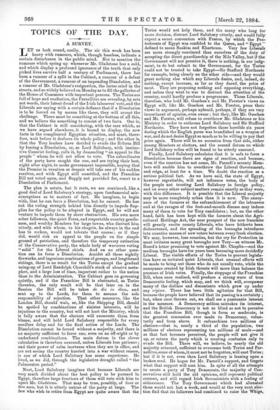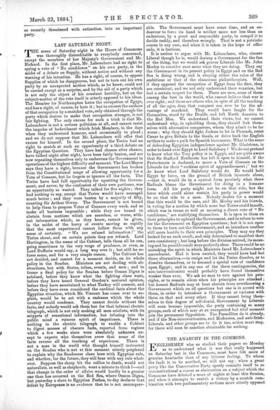TOPICS OF THE DAY.
A SURVEY.
TAET us look round, coolly. The air this week has been heavy with rumours, which, though baseless, indicate a certain disturbance in the public mind. Not to mention the rumours which spring up whenever Mr. Gladstone has a cold, and which display a profound ignorance of the truth that only picked lives survive half a century of Parliament, there has been a rumour of a split in the Cabinet, a rumour of a defeat of the Government, a rumour of an impending Dissolution, and a rumour of Mr. Gladstone's resignation, the latter cried in the streets, and so widely believed on Monday as to fill the galleries of the House of Commons with important persons. The Tories are full of hope and exultation, the ParneRites are revealing, by acts not words, their latent dread of the Irish labourers' vote, and the Liberals are saying with a certain defiance that if a Dissolution is to be forced on by means like these, they will accept the challenge. There must be something at the bottom of all this, and we believe the something to consist of two facts. One is, that the Cabinet is still considering, with the care which, as we have argued elsewhere, it is bound to display, the new facts in the complicated Egyptian situation, and must, there- fore, wait before it declares its whole policy ; and the other is, that the Tory leaders have decided to evade the Reform Bill by forcing a Dissolution, or, as Lord Salisbury, with instinc- tive Ca3sarist feeling, calls it, by demanding "an appeal to the people" whom he will not allow to vote. The subordinates of the party have caught the cue, and are trying their best, night after night, to make government impossible, hoping that the Premier in vexation or despair will take one of his sudden resolves, and with Egypt still unsettled, and the Franchise Bill not voted upon, and Supply not provided for, resort to a Dissolution of Parliament.
The plan is astute, but it rests, we are convinced, like a good deal of Lord Salisbury's strategy, upon fundamental mis- conceptions as to matters of fact. He imagines, to begin with, that he can force a Dissolution, but he cannot. He has not the voting strength behind him directly to impede Sup- plies for the policy to be adopted in Egypt, and he will not venture to impede them by sheer obstruction. His own more sober followers, the quiet Peers, and respectable country gentle- men, and wealthy Members for large towns, who distrust him utterly, and with whom, to his chagrin, he always in the end has to reckon, would not tolerate that course ; or if they did, would risk an appeal to the people on the simple ground of patriotism, and therefore the temporary extinction of the Conservative party, the whole body of waverers voting " solid " for the Liberal chiefs. And on no other ques- tion can he force a Dissolution. Amidst all these nightly fireworks, and ingenious combinations of groups, and lengthened sittings, there is no result for the Tories except the gradual using-up of Lord Randolph Churchill's stock of abusive meta- phor, and a large loss of time, important rather to the nation than to the Administration. The Cabinet goes on governing quietly, and if the Franchise Bill is obstructed, as Tories threaten, the only result will be that later on, in the Session the Bill will be taken de die in diem, and sent up to the Lords, for them to assume the sole responsibility of rejection. That other measures, like the London Bill, should wait, or, like the Shipping Bill, should be spoiled by combinations of sinister interests, will be injurious to the country, but will not hurt the Ministry, which is fully aware that the electors will exonerate them from blame, and will hold Lord Salisbury responsible for every needless delay and for the final action of the Lords. The Dissolution cannot be forced without a majority, and there is no majority sufficient to force one, even on an off-night or by underhand combinations. The main datum in the clever calculation is therefore unsound, unless Liberals lose patience ; and their power of calm inertness when they are in office, and are not seeing the country hurried into a war without reason, is one of which Lord Salisbury has some experience. He lived, as we did, through the legislative drought called " the Palmerston period."
Next, Lord Salisbury imagines that because Liberals are very much divided about the best policy to be pursued in Egypt, therefore large fractions of them will vote with him to upset Mr. Gladstone. That may be true, possibly, of four or five men, but it is utterly untrue of the party at large. The few who wish to retire from Egypt are quite aware that the
Tories would not help them, and the many who long for more decision, distrust Lord Salisbury utterly, and would fully' expect a secret convention with France, by which the Pro- tectorate of Egypt was confided to the Queen, and " Egypt " defined to mean Suakim and Khartoum. Very few Liberal's are more strongly convinced than ourselves of the duty of accepting the direct guardianship of the Nile Valley, but if the Government will not perceive it, there is nothing, in our judg- ment, to do but submit to the Government, for the Tories. could not be trusted to take Egypt—Sir Stafford Northeote for example, being clearly on the other side—and they would grant nothing else which any Liberals desire, and, indeed, do. nothing, except increase, as far as they dared, the price of meat. They are proposing nothing and opposing everything, and unless they went to war to distract the attention of the country, could hardly produce a programme. Those Liberals,, therefore, who hold Mr. Goschen's and Mr. Forster's views on Egypt will, like Mr. Goschen and Mr. Forster, press their views in argument, perhaps upbraid, perhaps, if they are very incontinent of opinion, even swear ; but they, like Mr. Goscherr and Mr. Forster, will refuse to overthrow Mr. Gladstone or his Ministry in order to enthrone Lord Salisbury and Sir Stafford' Northcote. They have not forgotten those horrible six years- during which the English purse was brandished as a weapon of war, and do not desire Egypt so much as to be willing to pay that price again. There will be no secession from that side, either among Members or electors, and the second datum on which, Lord Salisbury relies will be found to be utterly unsound.
Finally, Lord Salisbury calculates that it is safe to force a Dissolution because there are signs of reaction, and because, even if the reaction has not come, Mr. Parnell's seventy Mem- bers will enable him to overthrow the Liberal Government,. and reign, at least for a time. We doubt the reaction as a serious political fact. As we have said, the state of Egypt.,. however regrettable, will not influence votes, the body of the people not trusting Lord Salisbury in foreign policy,. and on every other subject matters remain exactly as they were,. with this difference. It is possible that the Liberal majority may be more completely urban than it is now. The annoy- ance of the farmers at the enfranchisement of the labourers, and at the ravages of the foot-and-mouth disease may induce. many of them to vote for Tory candidates ; but, on the other hand, faith has been kept with the farmers about the Agri- cultural Holdings Act, the near prospect of the new franchise will greatly excite county Liberals, who have hitherto been disheartened, and the spreading of the boroughs introduces. into counties masses of new voters between every fresh election. We may, however, lose counties, but the cry for Protection in meat irritates many great boroughs now Tory—as witness Mr.. Boord's letter promising to vote against Mr. Chaplin—and the- medium boroughs have for years been becoming more decidedly Liberal. The visible efforts of the Tories to prevent legisla- tion have so irritated quiet Liberals, that unusual efforts will be made to bring out those who do not usually vote, while the. annoyance created by Irish threats will more than balance the pressure of Irish votes. Finally, the stoppage of the Franchise Bill, when once realised, will produce a strong wave of true Democratic feeling, which may, and we think will, overpower many ofthe dislikes and discontents which grow up under any regime. There has been little agitation for that Bill,. because the people have believed that its passing is a certainty ; but, when once thrown out, we shall see a passionate interest in the measure. A Democracy seldom mistakes its interest, and the British Democracy is not so blind as not to perceive that the Franchise Bill, though in form so moderate, is the greatest concession ever made to Democracy, volun- tarily and from above. It enfranchises two millions of electors—that is, nearly a third of the population, two- millions of electors representing ten millions of souls—and as that fact becomes perceived, the people will not give it up, or return the party which is creating confusion only to evade the Bill. There will, we believe, be nearly the old majority returned, sufficient to overcome both Tories and Par- nellites, some of whom, it must not be forgotten, will oust Tories; but if it is not, even then Lord Salisbury is leaning upon a broken reed. He hopes for Mr. Pamell's support, and forgets what that support will cost him. In spite of all the attempts to create a party of Tory Democrats, the majority of Con- servatives still hold the old opinions, still represent political content, and still regard Irish Secessionists with a feeling of abhorrence. The Tory Government which had alienated them would not last a week, and would at the very next elec- tion find that its followers had combined to raise the Whigs, so recently threatened with extinction, into an important party.



































 Previous page
Previous page